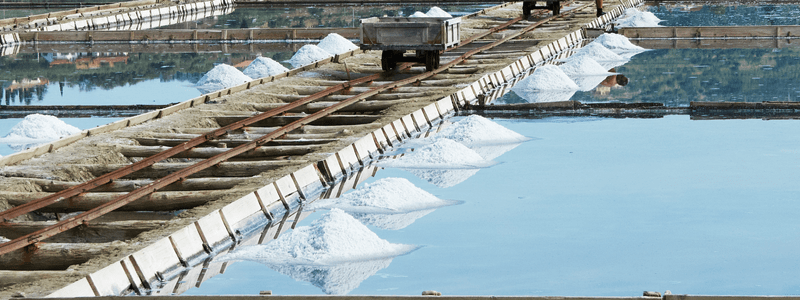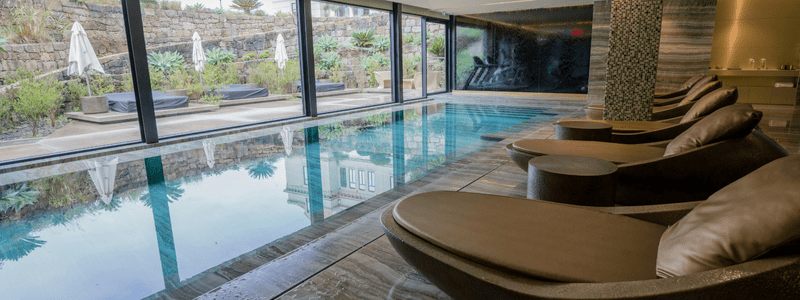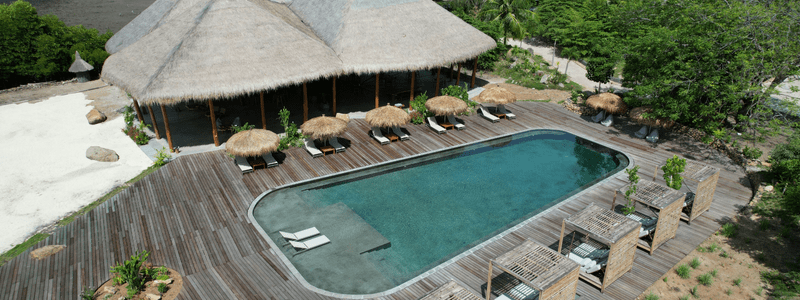Key Takeaways
Saltwater pools use a salt chlorination system, producing chlorine naturally through electrolysis for softer, gentler water without harsh chemical effects.
The swimming experience is more luxurious, with silky-feeling water that’s easier on the skin, eyes, and hair, especially great for sensitive swimmers.
Maintenance is simpler and more consistent, with fewer chemical additives needed and more stable chlorine levels throughout the season.
Long-term costs are often lower, despite higher installation costs, thanks to reduced need for chemical purchases and balanced water chemistry.
Saltwater pools vs. natural pools: Saltwater systems offer refined, modern comfort with low maintenance, while natural pools provide an eco-friendly, chemical-free alternative.
Saltwater pools can be mildly corrosive to some materials, so proper equipment selection and salt level monitoring are essential.
Ideal for those seeking low-maintenance luxury, saltwater pools turn your backyard into a spa-like retreat with a clean, modern aesthetic.
Upgrade Your Experience
Imagine diving into crystal-clear water, soft against your skin, and free from the overpowering smell of chlorine. That’s the beauty of a saltwater pool, an oasis designed for both relaxation and luxury.
Saltwater pools have seen a rise in popularity, especially among homeowners seeking a more natural swimming experience that is gentler on the body and easier to maintain.
But these pools are more than just a trend. They represent a sophisticated way to elevate your outdoor space, offering a comfortable, luxurious swimming experience that sets them apart from traditional chlorine pools.
Let’s explore everything you need to know about saltwater pools, how they compare to chlorine pools, and the benefits that make them an enticing option for a high-end retreat in your own backyard.
What is a Saltwater Pool?
A saltwater pool is not just an ordinary pool filled with seawater. Instead, it uses a saltwater chlorination system, which relies on salt to generate chlorine naturally.
This means you still get the sanitizing benefits of chlorine, but in a softer, more refined form. A saltwater generator, or salt chlorinator, splits salt molecules into chlorine through a process called electrolysis, maintaining clean, safe water without the harsh effects associated with adding chlorine directly.
The level of salt in a saltwater pool is considerably lower than that of seawater, typically around 3,000 parts per million, compared to 35,000 in the ocean.
This means you get the benefits of saltwater’s softness without any uncomfortable sting in your eyes. The result? Water that feels smooth and silky, which transforms your pool into a luxury retreat that’s not just beautiful but also wonderfully gentle on your skin and hair.

Benefits of a Saltwater Pool
1. Softer, Gentle Water
The water in a saltwater pool has a different texture from what you find in a typical chlorine pool. It’s softer, less abrasive, and often feels almost silky against the skin.
This means that after swimming, you’re less likely to experience dry, itchy skin or the red eyes that are common after a swim in a chlorine pool. For those who are sensitive to harsh chemicals, the benefits are immediately noticeable.
2. Less Chemical Handling
One of the key advantages of a saltwater system is the reduced need to manually add chlorine. The saltwater chlorinator handles chlorine production, so there’s no need for constant measuring, mixing, or storing of chemical products.
This simplifies maintenance and also means you aren’t handling potentially dangerous chemicals regularly.
3. Consistent Chlorine Levels
Saltwater systems generate chlorine slowly and steadily, leading to more consistent water quality.
This stability means fewer spikes and drops in chlorine levels, which helps maintain balanced, sanitized water without the peaks that can cause unpleasant odors or discomfort.
4. Lower Long-term Costs
Though the initial setup costs for a saltwater pool can be higher due to the chlorinator installation, long-term costs are often lower.
The ongoing expense of buying chlorine products is significantly reduced, and many owners find that they save money over time as their need for additional pool chemicals decreases.
5. Environmentally Friendly
Saltwater pools are considered a more environmentally friendly choice since they reduce the need for harsh chemicals and frequent chemical disposal.
The lower level of added chlorine also means less chemical runoff, which can be beneficial to the environment surrounding your property.

Saltwater Pool vs. Natural Pool
If you’re considering adding a pool to your garden, both saltwater and natural pools offer unique and luxurious experiences.
However, they provide quite different approaches to outdoor swimming, each with its own distinct benefits.
Water Treatment and Chemicals
Saltwater pools use a salt chlorinator to generate chlorine naturally, providing consistent sanitation while being gentler than traditional chlorine pools.
Natural pools, on the other hand, use biological filtration through aquatic plants, creating a chemical-free swimming environment. This results in pure, eco-friendly water but requires a more complex ecosystem to maintain.
Aesthetic and Design
Saltwater pools often have a modern, polished look with customizable luxury features like infinity edges and underwater lighting.
Natural pools, however, aim to blend seamlessly into the landscape, using stones, plants, and a regeneration zone to create an organic, pond-like appearance that feels truly at one with nature.
Environmental Impact
Natural pools are the most eco-friendly option, utilizing plant filtration to maintain clean water, supporting local wildlife, and reducing chemical use entirely.
Saltwater pools still involve chlorine, albeit at much lower levels, and can have a mildly corrosive effect on surrounding areas if improperly managed.
Maintenance
Saltwater pools reduce manual chemical handling, requiring only occasional salt cell cleaning and water chemistry adjustments.
Natural pools need regular care for aquatic plants and balancing the ecosystem but tend to self-regulate once established, making them relatively low-maintenance after initial setup.
Sensory Experience
The water in saltwater pools feels softer than chlorine but still has slight salinity, providing a comfortable swimming experience without the harsh chemical smell.
Natural pools, by contrast, offer a more immersive experience, surrounded by plants and natural water, akin to swimming in a clear, natural pond.
Cost Considerations
Both types of pools come with higher initial installation costs compared to traditional chlorine pools. Saltwater pools require a salt chlorinator, while natural pools need a regeneration zone with aquatic plants.
Long-term costs are typically lower for natural pools due to the lack of chemical purchases, but both require regular equipment and ecological upkeep.
Saltwater pools and natural pools both offer luxurious backyard experiences but cater to different tastes. If you desire a refined, modern pool with low-maintenance water quality, a saltwater pool offers a blend of convenience and comfort.
If you prefer a chemical-free, nature-inspired experience, a natural pool offers an ecologically balanced and visually harmonious option that becomes part of your garden’s natural beauty.
The choice ultimately comes down to whether you’re drawn to sophisticated poolside luxury or the serene immersion of a natural environment—both have the power to transform your garden into a stunning retreat.

Saltwater Pool vs. Chlorine Pool: A Comparison
Comfort and Health
A major difference between saltwater and chlorine pools is how they feel and affect the body. Chlorine pools often have high levels of the chemical, which can cause eye irritation, skin dryness, and the unmistakable chlorine scent that lingers on your skin and swimwear.
In contrast, saltwater pools offer a much more comfortable swimming experience. The water is naturally softer, and there’s no overpowering chemical smell. If you or your family have sensitive skin or are prone to allergies, a saltwater pool is a more luxurious option.
Maintenance and Chemical Handling
Traditional chlorine pools require consistent monitoring and manual chlorine addition to keep the water sanitized. Saltwater pools, on the other hand, generate chlorine through electrolysis, requiring less frequent attention.
However, while saltwater pools are lower maintenance in terms of chemical handling, they still need regular equipment checks. The salt cell needs to be inspected and cleaned to ensure the chlorination process is functioning properly.
Cost and Installation
The installation cost of a saltwater pool can be higher than a traditional chlorine pool due to the saltwater chlorinator.
However, with fewer ongoing chemical purchases, many homeowners find that saltwater pools have lower operational costs over time. That said, the salt cell, which is part of the generator, will need replacement every five to seven years, which is an additional cost to factor in.
Equipment Considerations
Saltwater, while less harsh to the skin, can be more corrosive to certain types of equipment and pool surfaces if not properly managed.
Metals such as stainless steel and some pool liners may degrade faster in a saltwater environment, making it important to choose compatible materials and monitor salinity levels carefully.
Water Quality and Feel
The water in saltwater pools generally feels softer, akin to swimming in naturally softened water. Chlorine pools often have a more intense chemical presence, which can dry out hair and skin.
The gentleness of saltwater is a significant advantage for those looking to create a spa-like, relaxing experience.

How Does a Saltwater Pool Work
The heart of a saltwater pool is the salt chlorine generator. This device converts salt into chlorine through electrolysis, keeping the pool water sanitized. Here’s a simplified look at how the process works step by step.
- Adding Salt: Salt is added to the pool water, dissolving completely. The concentration is far less than ocean water, just enough to create a comfortable swimming environment.
- Electrolysis Process: The saltwater passes through the chlorine generator, which uses an electrical charge to break down the salt (sodium chloride) into chlorine (sodium hypochlorite). This chlorine is then released into the water to sanitize the pool.
- Sanitizing the Pool: Unlike adding liquid chlorine, which leads to fluctuating chlorine levels, the generator maintains a consistent output, keeping the water continuously sanitized.
The result is a pool that essentially produces its own chlorine, reducing the need for handling chemicals and making water maintenance more straightforward.

Maintenance of a Saltwater Pool
Owning a saltwater pool can reduce some of the chemical management compared to a traditional pool, but it still requires attention. Here’s what you need to know.
Salt Cell Cleaning
The salt cell is responsible for converting salt into chlorine. Over time, calcium and other mineral deposits can build up on the cell, reducing its efficiency.
Cleaning the salt cell every three to six months helps keep your system functioning properly.
Balancing Water Chemistry
Saltwater pools require regular testing of pH, alkalinity, and calcium hardness levels. Saltwater tends to naturally raise pH, so regular adjustments with muriatic acid may be necessary to maintain balance.
Properly balanced water ensures that your pool’s components are protected from scale and corrosion.
Monitor Salt Levels
Salt levels should be maintained between 2,700 and 3,400 parts per million (ppm), depending on your system’s specifications.
Low salt levels reduce the chlorinator’s ability to produce chlorine, while high levels can be corrosive to pool equipment.
Seasonal Maintenance
During the swimming season, weekly water checks and salt level monitoring are important. In winter, depending on your region, you may need to winterize the pool, especially if you live in an area with freezing temperatures.
Many saltwater systems can be set to a maintenance mode during the off-season.
Equipment Inspections
Check the chlorinator and other equipment regularly for wear. While saltwater pools involve less manual chlorine addition, the generator itself needs attention to function effectively.

Potential Drawbacks of a Saltwater Pool
Initial Setup Cost
The upfront cost of a saltwater chlorination system can be significantly higher than a traditional chlorine pool setup. This includes the cost of the saltwater generator as well as any additional materials needed for the installation.
Corrosive Effects
Salt, while mild on the skin, can be corrosive to certain pool equipment and surfaces if levels aren’t properly managed. Items like metal railings, ladders, or fixtures may need to be treated or replaced over time.
Regular Maintenance for Longevity
While saltwater pools generally require less daily or weekly maintenance, they do need careful attention to equipment and salt levels.
The salt cell, for example, is a crucial component that must be cleaned and eventually replaced.

Is a Saltwater Pool Right for You?
If you’re looking for a pool with luxurious, silky water and lower maintenance in terms of chemical handling, a saltwater pool might be a perfect choice.
It’s particularly well-suited for those who desire a more natural feel and are concerned with skin and eye comfort.
However, it’s important to weigh the upfront investment and understand the maintenance requirements, especially regarding the impact on equipment and the need for regular system checks.
The decision between saltwater and chlorine ultimately comes down to what kind of experience you’re looking for in a pool.
For those seeking a premium swimming experience, the comfort and ease offered by a saltwater system provide a level of luxury that is hard to match. The reduced chemical smell, gentle feel of the water, and the consistency of chlorine levels are all factors that enhance the overall swimming environment.
A saltwater pool creates a space that feels like a spa, a personal retreat in your backyard that encourages relaxation and enjoyment without the harsh effects of traditional pool chemicals.

Conclusion
A saltwater pool is more than just an alternative to a chlorine pool. It’s an elevated, luxurious swimming experience that enhances both comfort and convenience. With softer water that is gentle on the skin, less handling of harsh chemicals.
The benefits of consistent chlorine levels, saltwater pools are an enticing choice for those looking to create a sophisticated backyard oasis. They offer the ideal blend of beauty, health benefits, and ease of maintenance, turning your outdoor space into a true retreat.
While the initial investment is higher, and careful attention must be paid to maintain equipment and salt levels, the rewards are well worth it. A saltwater pool invites you to spend more time relaxing and less time managing chemicals. It’s about creating a space that not only complements your lifestyle but also promotes well-being, a space that is tranquil, welcoming, and decidedly luxurious.
If you’re ready to transform your backyard into a place of true comfort, a saltwater pool may be just what you need.
With a careful balance of practical care and thoughtful design, your saltwater pool can become the centerpiece of a stunning, serene outdoor environment. One that you, your family, and your guests can enjoy for years to come. Dive into the possibilities and create a pool that goes beyond functionality, offering a beautiful and soothing experience every time you take a swim.
Ready to bring spa-level comfort to your own backyard?
Explore our swimming pool services and let us help you design a modern, low-maintenance oasis that feels as good as it looks. It’s time to upgrade your swim experience.

FAQ
How salty is a saltwater pool compared to the ocean?
A saltwater pool has a salt level of approximately 3,000 parts per million (ppm), which is significantly lower than the ocean’s 35,000 ppm. This means the water is comfortable to swim in, without the sting or the intense taste of seawater.
Are saltwater pools completely chlorine-free?
No, saltwater pools are not chlorine-free. They use a salt chlorinator to generate chlorine from salt, which still sanitizes the pool. The difference is in how the chlorine is produced—more gradually and naturally—resulting in a gentler experience.
How often should the salt cell be cleaned?
The salt cell should be cleaned every three to six months to prevent calcium buildup and ensure the chlorine generation process remains efficient. It’s an important maintenance step to keep your saltwater system working smoothly.
Do saltwater pools require fewer chemicals overall?
Generally, yes. Saltwater pools require fewer chemicals compared to traditional chlorine pools since chlorine is continuously generated by the chlorinator. However, pH levels may need to be managed with additives like muriatic acid.
Can I convert my existing chlorine pool into a saltwater pool?
Yes, most traditional pools can be converted to saltwater with the installation of a salt chlorinator and the addition of pool-grade salt. It’s a great way to upgrade to a more luxurious swimming experience without starting from scratch.



